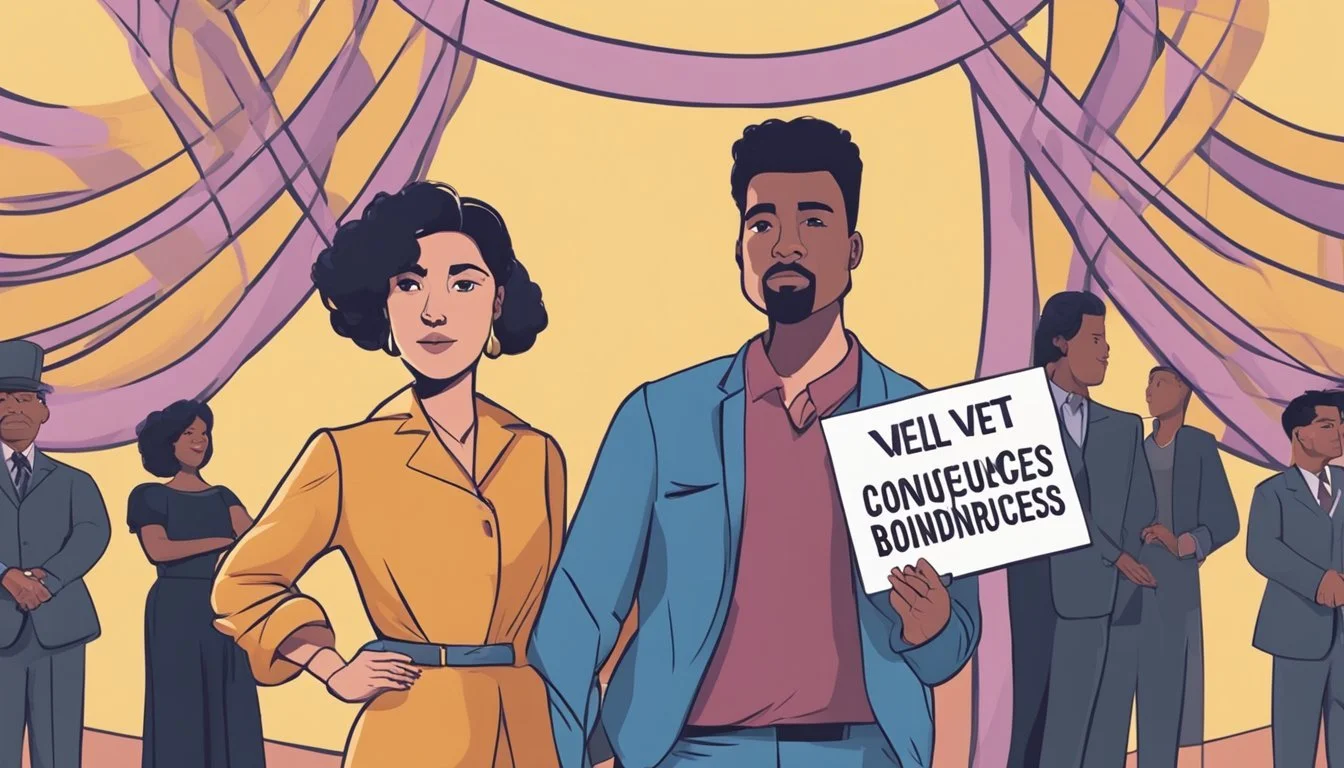7 Ways to Establish Healthy Boundaries with a Narcissistic Celebrity or Public Figure
Practical Strategies for Personal Well-being
Navigating interactions with narcissistic celebrities or public figures can be challenging, especially when their behavior impacts your personal or professional life. Establishing healthy boundaries is crucial for maintaining your well-being and ensuring respectful interactions. Understanding how to effectively set limits can empower you to protect your mental and emotional health.
Celebrities and public figures often wield significant influence, and their narcissistic tendencies can exacerbate power imbalances. By learning and implementing strategies for boundary setting, you can create a more balanced and respectful dynamic. This approach not only benefits you but also fosters healthier relationships in your broader interactions.
1) Clearly Communicate Your Limits
Communicating your limits is essential when dealing with a narcissistic celebrity or public figure. To ensure your boundaries are understood, use direct and clear language.
Specify what behaviors are unacceptable and what actions you will take if those limits are crossed. Avoid using ambiguous or passive language. Clarity is crucial.
Use "I" statements to express your feelings and needs. For instance, say "I feel disrespected when you interrupt me, and I need you to let me finish speaking."
Avoid justifying or defending your boundaries. Narcissists may try to manipulate or challenge your limits. Stand firm without getting drawn into unnecessary arguments.
Keep your communication concise and focused. Long-winded explanations can lead to misunderstandings. Remember, simplicity is effective.
Choose the right time and setting to discuss your boundaries. Ensure both parties are calm and receptive, as intense emotions can hinder effective communication.
Regularly revisit and reinforce your boundaries. Consistency helps in maintaining respect and understanding over time.
2) Avoid Personal Interactions
To protect one’s emotional and mental well-being, minimizing personal interactions with a narcissistic celebrity or public figure is crucial. These individuals often seek to dominate conversations and exploit any vulnerabilities they perceive.
Maintaining a professional distance can help prevent manipulation. Engage only in necessary communications, keeping them brief and to the point. This approach reduces opportunities for the individual to assert control or draw you into conflict.
In public settings, it is best to remain polite but detached. Avoiding personal topics and sticking to neutral subjects can help maintain this distance. Responding with vague but courteous replies can deter attempts to pry into personal details.
Using written communication, when possible, allows for more control over the conversation. Emails and messages can be carefully crafted to avoid emotional triggers. This method also creates a record of interactions, which can be helpful if disputes arise later.
In situations where personal interaction is unavoidable, setting clear boundaries is essential. For instance, make it known that certain topics or behaviors are off-limits. Consistently enforcing these boundaries reinforces them over time.
3) Use Written Communication
Using written communication can be an effective way to establish boundaries with a narcissistic celebrity. By putting your expectations and limits in writing, you create a clear and unchangeable record of your interactions.
When dealing with a narcissist, conversations can easily become manipulative. Written communication can help avoid such traps.
Emails and messages limit emotional manipulation. They allow you to think through your responses carefully before sending them.
Instead of engaging in in-person meetings or phone calls, opt for emails or direct messages. This provides a buffer and gives you time to process their requests without immediate pressure.
Written communication also makes it easier to document any boundary violations. This can be useful if the situation escalates and you need evidence of the narcissist's behavior.
Always be direct and concise in your written interactions. Avoid giving elaborate explanations or justifications.
Set clear and specific boundaries in your messages. For example, state explicitly what behaviors are unacceptable and what the consequences will be if those boundaries are crossed.
Rely on writing to maintain professional and personal integrity. This approach helps in keeping interactions objective and reduces the chances of being emotionally drained or manipulated. For more tips on setting boundaries, Psychology Today offers valuable insights.
4) Set Time Boundaries
When dealing with a narcissistic celebrity or public figure, establishing limits on your time is essential. Time boundaries ensure that your personal schedule is protected and not overshadowed by the other person’s demands.
Begin by clearly identifying the amount of time you are willing to dedicate to interactions. Be specific about dates, times, and durations.
Communicate these limits firmly and consistently. Avoid being swayed by guilt or pressure to extend your availability, as narcissists often push boundaries.
For public interactions, set specific time frames for engagement, whether it's events, interviews, or meetings. Ensure that these elements are planned in advance and stick to the agreed schedule.
In digital communications, establish clear guidelines on response times to messages or requests. Specify that you check and respond to such communications at certain times of the day.
Maintaining punctuality and enforcing these time frames can help to assert your independence and keep the dynamic within professional limits. Keep these boundaries clear and non-negotiable to ensure they are respected in the long term.
By doing so, you can safeguard your personal and professional time, ensuring it aligns with your commitments and well-being.
5) Seek Legal Advice
Dealing with a narcissistic celebrity or public figure can sometimes lead to legal complications. Engaging a qualified attorney is crucial to navigate potential legal issues effectively. They can provide insights and devise strategies that protect your interests.
Legal professionals can help with restraining orders or defamation lawsuits if necessary. Their expertise ensures that the actions taken are within the legal framework, reducing the risk of further complications. They can also assist in drafting cease-and-desist letters.
It’s vital to document any interactions or incidents meticulously. Detailed records support your case, making it easier for your legal advisor to build a strong argument. This documentation can include emails, messages, or any direct communication you receive.
Consulting an attorney allows you to understand your rights and obligations. They can guide you on the best course of action, ensuring that your boundaries are legally supported. This step is critical when dealing with individuals who might exploit their public image to undermine your position.
For more detailed guidance on handling these situations, you can refer to resources like those in the Mind Psychiatrist article.
6) Engage Mediators for Meetings
When dealing with a narcissistic celebrity or public figure, engaging a mediator for meetings can be crucial. Mediators act as neutral parties who facilitate communication and negotiations.
Mediators can help maintain a structured environment. They ensure that discussions remain focused and prevent conflicts from escalating. This is particularly important when dealing with someone known for their manipulative or aggressive tactics.
A mediator can also provide an objective perspective. They can assist in clarifying misunderstandings and offer unbiased solutions to issues. This helps both parties feel heard and respected, reducing the likelihood of defensive reactions.
It's advisable to choose a mediator with experience in handling narcissistic behavior. Professionals familiar with these dynamics can better manage the complexities involved, ensuring a smoother interaction.
Using a mediator can also help maintain boundaries. They can reinforce the necessity of adhering to agreed terms and discourage any attempts to overstep. This creates a sense of accountability for both parties.
Engaging a mediator can make negotiations less stressful. By acting as a buffer, the mediator absorbs some of the emotional intensity, allowing both parties to communicate more effectively and calmly.
For individuals constantly in the public eye, this approach can lead to more productive and amicable outcomes. This promotes a healthier working relationship, minimizing the potential for public disputes.
7) Establish Consequences
Setting clear consequences for when boundaries are crossed is crucial when dealing with a narcissistic celebrity or public figure. This ensures that they understand the limits and respect them.
For instance, if they continually contact you outside agreed-upon times, specify that you will not respond to any messages sent during those hours.
Communicate these consequences directly and assertively. Make sure there is no ambiguity about what will happen if boundaries are breached.
Be consistent in enforcing the consequences. If you said you would not engage in conversations that turn abusive, follow through by ending the call or leaving the room immediately.
Consistency helps reinforce the boundaries and teaches the narcissistic person that there are real repercussions for their actions.
If the narcissist tries to manipulate or guilt-trip you into ignoring your own rules, remain firm. Avoid lengthy explanations or justifications for why the boundary exists.
The clarity and firmness of consequences are essential for maintaining your own mental health and protecting yourself from manipulative behaviors.
Understanding Narcissism
Narcissism is characterized by behaviors and traits that focus heavily on self-interest and self-admiration. Public figures with narcissistic tendencies may exhibit certain patterns that set them apart.
Traits of Narcissistic Individuals
Narcissistic individuals often display a mix of charm and arrogance. They have an inflated sense of their own importance and a deep need for excessive attention and admiration. These traits may include:
Grandiosity: They believe they are superior and deserve special treatment.
Lack of Empathy: Struggling to recognize or identify with the feelings of others.
Manipulativeness: Using others for personal gain without remorse.
Envy: Being jealous of others or believing others are envious of them.
Entitlement: Expecting constant, favorable treatment without reciprocating.
These traits can lead to strained relationships and difficulties in personal and professional settings.
Narcissism in Public Figures
Public figures with narcissistic traits thrive on attention and validation. They may pursue careers in entertainment, politics, or business, where public admiration is readily available.
In such roles, narcissism is often masked by charm and confidence, making it difficult to identify without deeper interaction. They may react negatively to criticism and engage in behaviors to maintain their perceived superiority.
Their need for admiration and control can manifest in charismatic yet dominating performances. Understanding these dynamics can help one navigate interactions with narcissistic public figures more effectively.
Effective Communication Strategies
Navigating interactions with a narcissistic celebrity or public figure requires clarity and composure. This section explores establishing clear expectations and responding non-defensively to maintain effective communication.
Setting Clear Expectations
Setting clear expectations is critical when engaging with a narcissistic public figure. Specify the behaviors and boundaries that are acceptable and those that are not. This involves being assertive and direct without being aggressive.
Example: If the person frequently interrupts, you might firmly state, "I need to finish my thoughts before being interrupted."
Clear communication helps reduce misunderstandings and reduces the opportunity for manipulation. Use "I" statements to emphasize personal boundaries and avoid placing blame, such as "I feel disrespected when I'm interrupted."
Understanding and communicating these limits can prevent overstepping and foster respect in interactions. Documenting agreements can also be beneficial, providing a reference to hold the narcissistic individual accountable.
Non-Defensive Responses
Non-defensive responses are vital to maintaining composure and control. Narcissists often use criticism or ambiguous comments to provoke and destabilize. Responding without defensiveness can maintain the dialogue's neutrality.
Instead of explaining or justifying actions, calmly acknowledge their perspective and redirect the conversation. For instance, respond to criticism with, "I hear you think that, let's move to the next point."
This technique refrains from giving the narcissist validation through escalation. Staying emotionally detached and viewing their comments objectively is crucial.
Example: If faced with a provocative comment, a neutral response could be, "That's an interesting view."
Limiting emotional reactions empowers the responder and keeps interactions productive. Employing these strategies helps in dealing with narcissistic behaviors effectively.
Emotional Self-C-care
In the context of dealing with a narcissistic celebrity or public figure, emotional self-care involves managing stress and anxiety, and building a solid support network.
Managing Stress and Anxiety
Dealing with a narcissistic public figure can significantly heighten stress levels. Stress management becomes crucial to maintain mental well-being. Techniques such as mindfulness meditation and deep breathing exercises can help calm the mind and body. Regular exercise is another effective method to reduce anxiety, as physical activity releases endorphins, which are natural mood lifters.
Setting boundaries is also integral to protecting oneself emotionally. Clearly defined limits help prevent the narcissist from overstepping and causing further emotional harm. Regular short breaks and 'me time' moments can be incorporated into daily routines to provide necessary respite.
Building a Support Network
Having a reliable support network aids in coping with the emotional toll inflicted by a narcissistic celebrity. Friends, family, and trusted colleagues can offer important emotional support. Sharing experiences and feelings with those who understand the situation can be therapeutic.
Professional help from therapists or counselors experienced in dealing with narcissistic behavior can provide valuable guidance. They can teach coping strategies and offer a safe space to express emotions. Online support groups and forums can also serve as a source of comfort and shared experiences. Connecting with others who face similar challenges helps alleviate feelings of isolation and provides practical advice.
Implementing regular self-care routines and surrounding oneself with supportive individuals is essential in managing the stress and emotional strain of interactions with narcissistic public figures.









